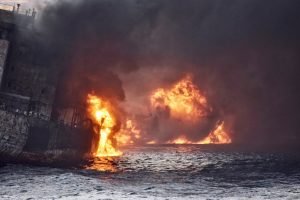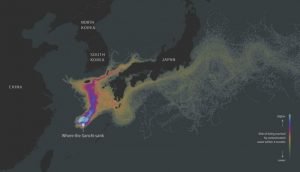
The oil from sunken tanker Sanchi is heading for Korean and Japanese fisheries according to the British National Oceanography Centre.
The tanker sank two weeks after crashing with a cargo ship in the East China Sea on January 6th. Registered in Panama and owned by Iranian interests the Sanchi was carrying 136,000 tonnes (960,000 barrels) of ultra-light crude as well as its own heavy diesel fuel. 30 Iranians and 2 Pakistanis on board the ship died in the accident. The ship burned for a week before it sank. This is almost as large as the Exxon Valdez and the largest oil spill since the BP Deppwater Horizon disaster in the gulf of Mexico.

The ultra light crude is difficult to clean up as it is highly flammable. Also known as condensate, it is used to create fuel for jet and rocket engines. At the time of the disaster it was hoped it would evaporate, or mix with the sea water and dissipate.
While the greatest danger to the Japanese and Korean shoreline remains the heavy diesel fuel from the ship, the impact of the highly toxic condensate under the water is yet to be determine. The British oceanographers are concerned about the impact on the coral reefs and fisheries in the area which are important food sources for both the Korean and Japanese people.
http://www.businessinsider.com/sanchi-oil-spill-china-images-2018-1/?r=AU&IR=T/#condensate-also-doesnt-form-a-containable-oil-slick-for-long-the-toxic-substance-can-evaporate-into-the-atmosphere-or-dissolve-in-water-5
https://www.zerohedge.com/news/2018-01-28/sanchi-oil-slick-could-reach-japan-within-month
